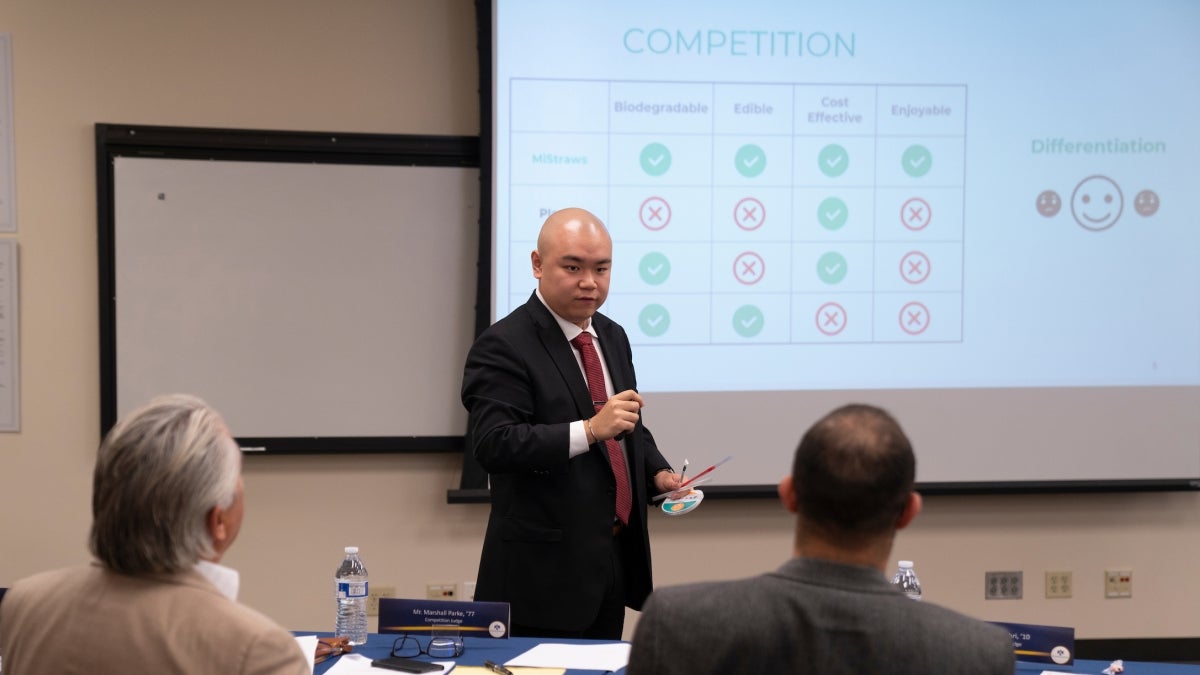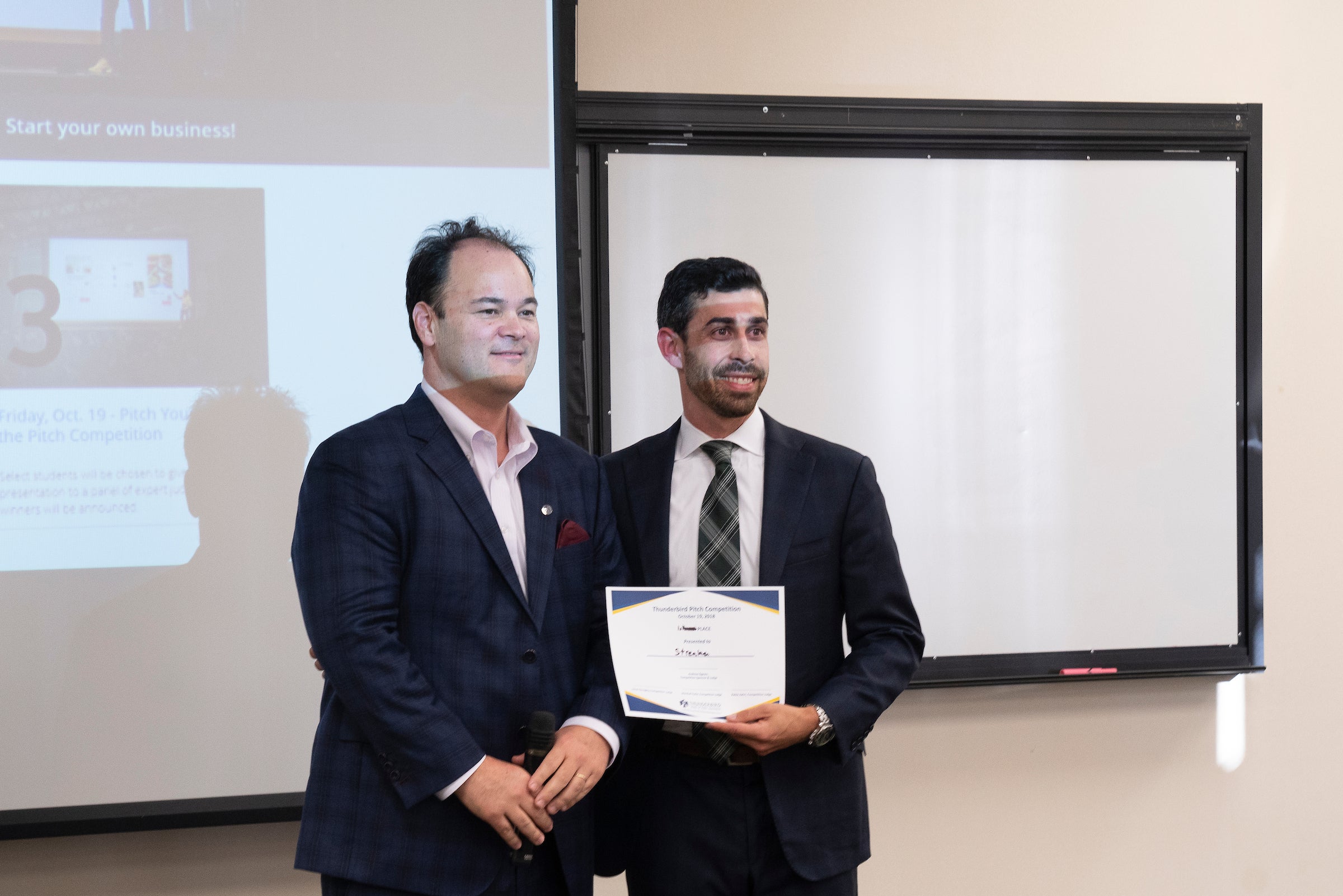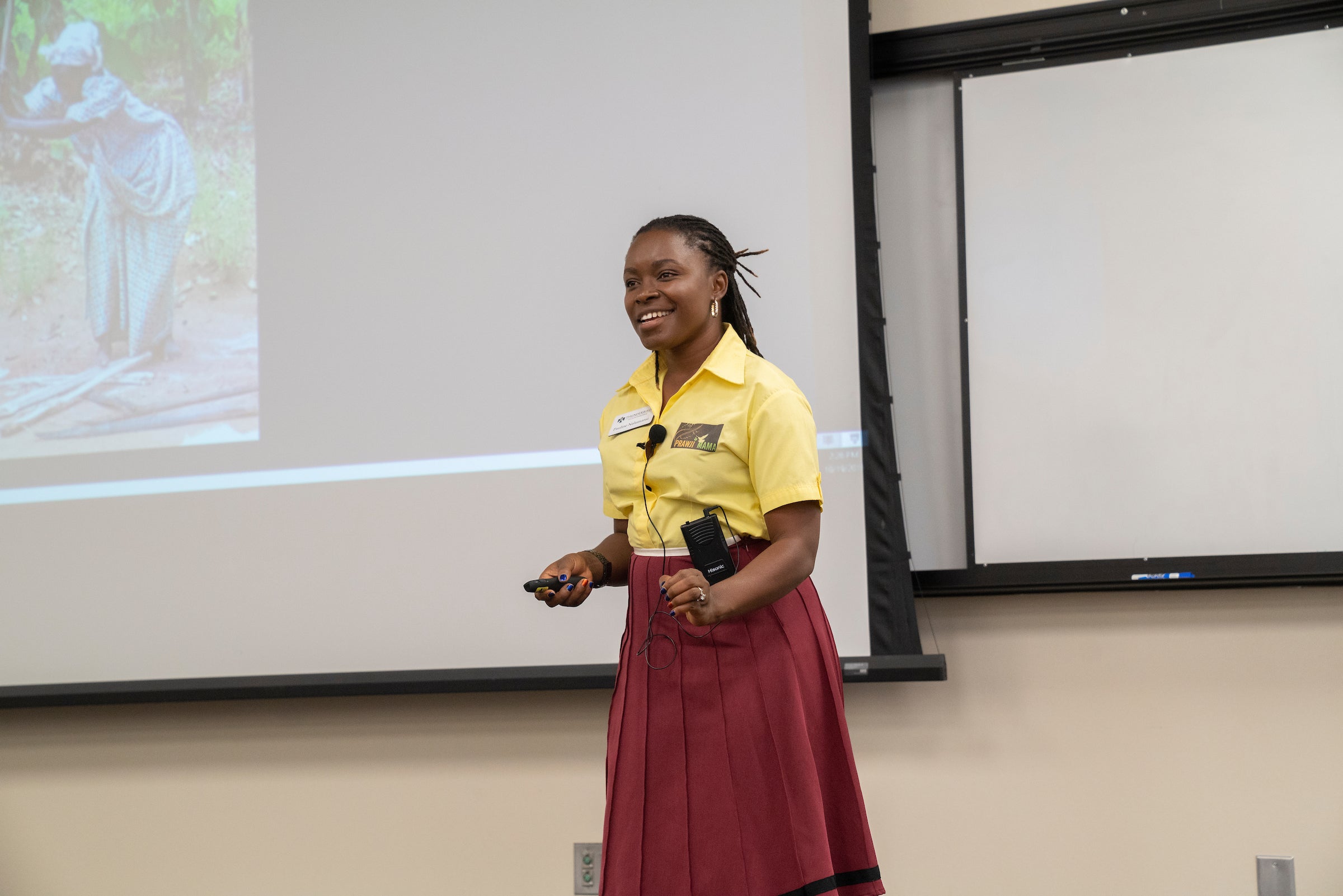Timing is everything, and the winning ventures at the Thunderbird Pitch Competition on Friday are capitalizing on the trends of the moment.
The grand-prize winner is taking advantage of the newly legalized industry of sports betting, and the second-place team is creating a business to rid the planet of plastic straws. They were among seven projects in the pitches led by students in the Thunderbird School of Global Management at Arizona State University.
The winning venture is called Streaker, a platform that would allow people who bet on sports to find the best forecasters. Created by Nicholas Vandam, the system would use the blockchain digital recorder to validate the results of people who make predictions. Successful predictors could sell their picks and Streaker would take a cut.
“The bottom line is — there’s no human involved,” Vandam said. “It’s a third-party software that doesn’t care about money. It’s just saying ‘true’ or ‘false.’"
The timing is right for Streaker: In May, the U.S. Supreme Court overturned the federal Professional and Amateur Sports Protection Act of 1992, calling it unconstitutional. Since then, six states have legalized sports betting, and most states are expected to follow within the next five years.
“Sports fans around the world should have an ecosystem to monetize their systems,” said Vandam, who won $3,000 in funding from the competition, which was judged by a panel of Thunderbird alumni entrepreneurs.
Judge Andrew Ogawa (left) presents Nicholas Vandam with the grand prize at the Thunderbird Pitch Competition on Oct. 19. The comeptition was revived this year by Ogawa and Thunderbird School of Global Management Director General and Dean Sanjeev Khagram. Photo by Marcus Chronicle/ASU Now
A team of two Thunderbird students is capitalizing on the trend of moving away from plastic straws, which are too small to recycle and can end up harming creatures in the ocean. Nicole Lei and Han Zhang created MiStraw, a venture that will produce straws made out of rice paper that are not only biodegradable but also edible, with a somewhat sweet taste. They won $1,500 for second place.
“We want to change the history of straw usage without changing consumer behavior,” Lei said.
Andrew Ogawa, a 1998 graduate of Thunderbird who was one of the judges and also the sponsor of the competition, told Zhang and Lei that straws are banned in his hometown of Palo Alto, California.
“This is a market that’s ripe for disruption,” he said. “I use paper straws, and I don’t like the taste.”
The third-place venture, which won $1,000, was Collie Court, a plan for an indoor dog park proposed by Amanda Frein and Mary Kelleher. The two plan to charge daily rates and offer monthly and annual memberships for the park, which would likely be housed in a vacant retail location and also serve as a doggie day care. Frein said the idea is based on successful indoor dog parks in Seattle.
“We want to make it a social center” with a coffee shop and café partner, she said.
Ogawa said that all the pitches were so good, the judges decided to give everyone money. The other student ventures, which each received $500, were:
• Prawji Mama Food Bank, a cooperative venture of farmers in Uganda that would offer training and resources for them to maximize profits. The food bank was launched over the summer by Pauline Nalumansi, who is a SHARE Fellow at Thunderbird. She was raised by her grandmother in Uganda and spent her childhood as a subsistence farmer with her family.
Pauline Nalumansi, a graduate student studying global affairs and management, presents her idea for the Prawji Mama Food Bank that would help Ugandan farmers raise crops and feed their families while connecting them to local and global markets. Photo by Marcus Chormicle/ASU Now
• Oasis, a floating bar and marina off the island of Grenada in the Caribbean. Ryan Hellpap started the venture earlier this year, anchoring a prefabricated houseboat-style structure in the water, drawing college students and boat owners. He plans to franchise the project.
• LiVR, a virtual-reality, live-streaming system that allows users a 360-degree experience at a sporting event. This project was invented by Larissa Simoncello and Brandon Dovgan.
• Raksha Ascent, a nonprofit that would provide outdoor retreats for girls in Nepal who have faced sexual exploitation. Jesse Breffle, who worked with a nonprofit group in Nepal earlier this year, created the idea.
The three winners will go on to pitch at Demo Day, a daylong competition with several funding tracks that’s sponsored by Venture Devils, a program in the office of Entrepreneurship + Innovation that provides mentorship and funding to entrepreneurs who are ASU students, faculty, alumni or community members. Demo Day will be held Nov. 30.
Top photo: Han Zhang, a graduate student studying global management, presents his business idea MiStraw, a plastic straw alternative made of rice paper, at the Thunderbird School Pitch Competition on Oct. 19. Photo by Marcus Chormicle/ASU Now
More Business and entrepreneurship

New rankings show impact of ASU W. P. Carey School of Business
Good rankings for Arizona State University's W. P. Carey School of Business reinforces the school's commitments to access, excellence and innovation.This week, the Financial Times Business Education…

Arizona Business and Health Summit asks attendees to innovate for value
Arizona State University's W. P. Carey School of Business hosted the third annual Arizona Business and Health Summit, sponsored by the Arizona Biomedical Research Centre, on Thursday, Nov. 14, in…

An economic forecast with lots of variables
The prospect of a new presidential administration is prompting some discussions among top economists.Tariffs, immigration, possible deportation, tax cuts and reduced renewable energy credits are top…


